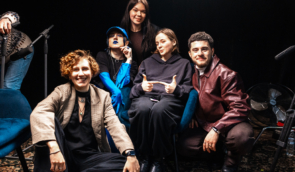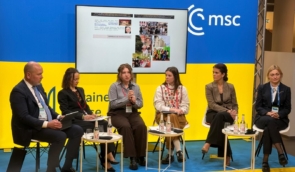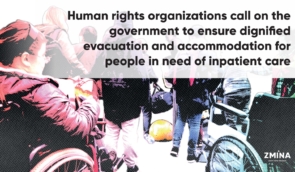Ukrainian civil society joined Restoring Justice for Ukraine Conference in The Hague
On 2 April 2024, the Netherlands, Ukraine and the European Commission co-hosted the international conference “Restoring Justice for Ukraine” in The Hague. It gathered foreign and justice ministers, representatives of the International Criminal Court, the Council of Europe, the Register of Damage for Ukraine and Eurojust. ZMINA together with Ukrainian Legal Advisory Group (ULAG), Media Initiative for Human Rights (MIHR), International Renaissance Foundation (IRF) and Coalition for the ICC (CICC) represented Dialogue Group on Accountability for Ukraine Workstream 4.
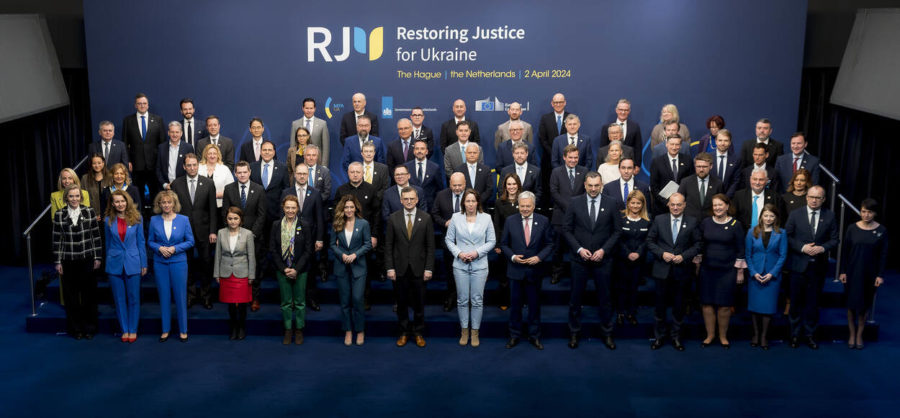 Photo: Conference participants by the Dutch Ministry of Foreign Affairs
Photo: Conference participants by the Dutch Ministry of Foreign AffairsThe conference was chaired by the Dutch Minister of Foreign Affairs Hanke Bruins Slot, the Ukrainian Minister of Foreign Affairs Dmytro Kuleba, the Dutch Minister for Justice and Security Dilan Yeşilgöz, and the EU Commissioner for Justice Didier Reynders. Speakers included Prosecutor of the ICC Karim Khan, the President of Eurojust Ladislav Hamran and the Secretary-General of the Council of Europe Marija Pejčinović Burić. King of the Netherlands Willem-Alexander and Ukraine’s President Volodymyr Zelenskyy also participated via video.
“We have to do everything possible for the strength of justice so that justice provides real strength to our common security – security from aggressions and terror. And let everyone who destroys peace be truly afraid of facing trial in The Hague,” addressed the conference participants President Volodymyr Zelenskyy.
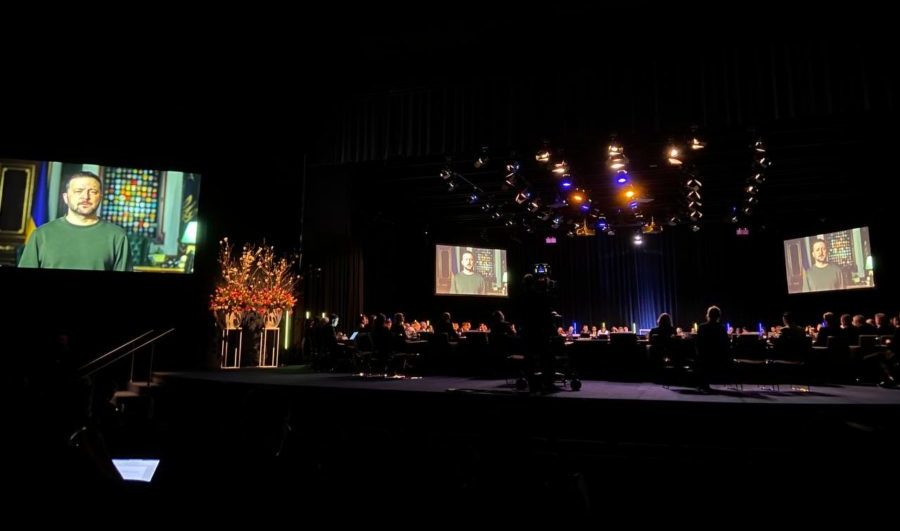 Photo: President Volodymyr Zelenskyy by ZMINA
Photo: President Volodymyr Zelenskyy by ZMINAThe conference highlighted the participants’ continued commitment to ensure accountability for the international crimes committed in Ukraine, facilitate their investigation and prosecution, including for the crime of aggression, and lay the groundwork for compensation for damages. In particular, there was announced the opening of the submissions on damage or destruction of residential immovable property to the Register of Damage for Ukraine. In the first day alone, the Register received more than 100 claims. It is expected between 300,000 and 600,000 claims in this category.
“This is a great achievement not only for the Ukrainian team, but also for the entire international community, a revolutionary event for global international law. The consultations are underway to fill the compensation fund with the frozen assets of the Russian Federation, because the aggressor must pay for the country’s suffering,” said Ukrainian Vice-Minister of Justice Iryna Mudra.
“Our decision to start the process of submission of claims is an important first step in this process. Success moving forward will require continued support from all stakeholders. The Register of Damage for Ukraine will continue its work with dedication and resolve to deliver justice to the Ukrainian people in conformity with its mandate,” explained the Chair of the Board Robert Spano.
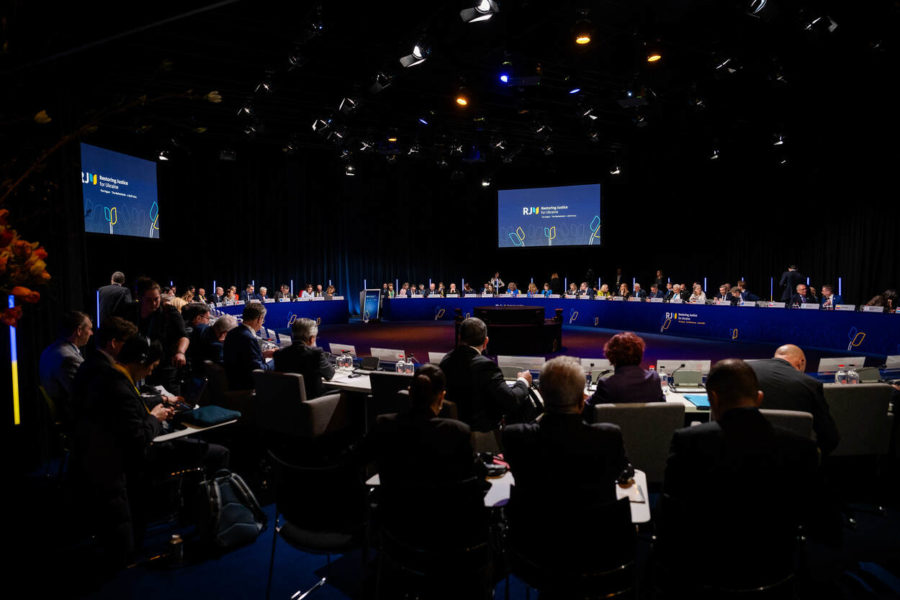 Photo: Conference by the Dutch Ministry of Foreign Affairs
Photo: Conference by the Dutch Ministry of Foreign AffairsOther categories of claims will be launched in the near future, including claims from survivors of torture, sexual violence, and deportation, as well as claims related to destruction of Ukraine’s critical infrastructure and cultural heritage. It is possible to sumbit a claim via “Diia”. In general, it is expected to receive up to 8 million claims.
“This is a significant step towards the restoration of justice and compensation for the victims. It also shows significant international support, readiness to create new mechanisms and support Ukraine and Ukrainians. However, the Register’s mandate covers only damage done since 2022 what excludes residents of the temporarily occupied Crimea and parts of Donetsk and Luhansk regions from facing justice and getting compensation. Moreover, there is a need to strengther cooperation with civil society and to coordinate the Register with the existing international mechanisms such as the ICC’s Trust Fund for Victims, as well as the Ukrainian Registers,” highlighted ZMINA’s International Advocacy Officer Tetiana Zhukova.
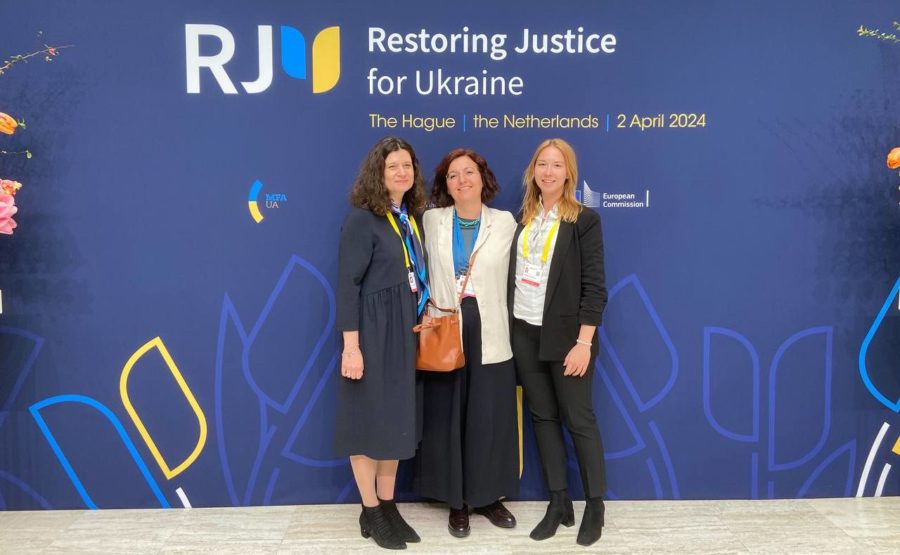 Photo: Nadia Volkova from ULAG, Virginie Amato from CICC and Tetiana Zhukova from ZMINA
Photo: Nadia Volkova from ULAG, Virginie Amato from CICC and Tetiana Zhukova from ZMINAIn addition, a meeting of the Dialogue Group was held during the conference. Nadia Volkova from Ukrainian Legal Advisory Group presented civil society’s recommendations:
“Since the beginning of armed conflict in Ukraine in February 2014, civil society organisations, members of Workstream 4 have been tirelessly documenting facts of gross human rights violations and the Rome Statute crimes, representing the interests of victims in domestic proceedings and in regional and international institutions, identifying and analysing legislative gaps and looking for and offering solutions, infrastructural and resource-related challenges, advocating for an increased domestic capacity – first during occupation of Crimea and armed hostilities in the East of Ukraine and later during the full -scale invasion. Yes, we have rich experience, depth and scale of understanding of the pertinent issues that can serve as an invaluable contribution to the work of the Dialogue Group, but most importantly, we have the trust of the victims and affected communities which is central to finding the most effective justice solutions for them,” stated Nadia Volkova.
She emphasized the need to ratify the Rome Statute by Ukraine; coordinate justice efforts and implementate the Rome Statute principle of complementarity; ensure the independence, impartiality and transparency of the ICC and provide sustainable funding to the court through its regular budget; establish a hybrid accountability mechanism for Ukraine to help streamline domestic capacity building; avoid perceptions of a two-tier accountability system in which some victims are more deserving than others; engage effectively with NGOs in all justice and accountability initiatives; create the special tribunal for the crime of aggression.
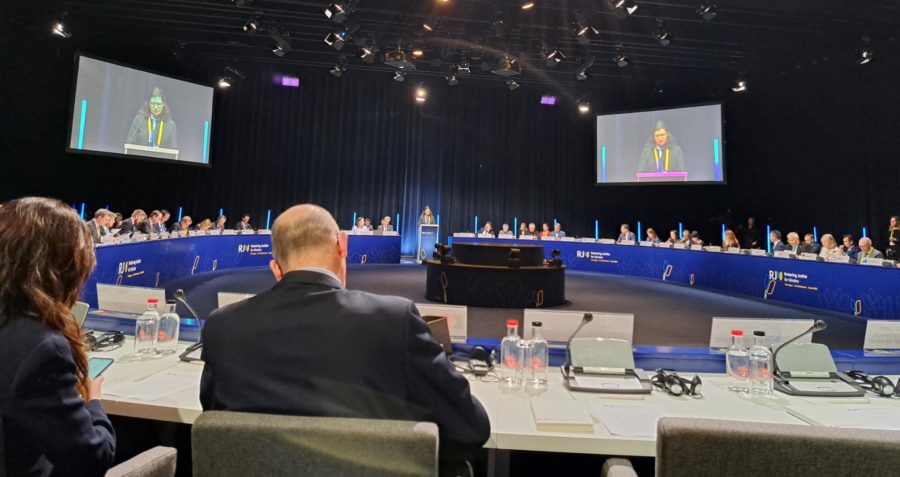 Photo: Nadia Volkova by CICC
Photo: Nadia Volkova by CICCIn a closing Declaration, 44 countries pledged to work toward establishing a special tribunal for the investigation and prosecution of the crime of aggression against Ukraine where Russian leaders could be prosecuted and to establish an international mechanism for reparation for damage, loss or injury, arising from the internationally wrongful acts of the Russian Federation in or against Ukraine.
“Conscious of the fact that the bulk of the work still lies ahead of us and that it will take considerable efforts from the entire international community to support Ukraine’s continued fight for justice during the ongoing war of aggression, we are committed to remaining united in our quest for justice for Ukraine for as long as it takes,” the Declaration says.
 Photo: ZMINA, MIHR, ULAG and IRF
Photo: ZMINA, MIHR, ULAG and IRFMoreover, using the opportunity of being in The Haague, the Ukrainian civil society had a meeting with the representatives of the Prosecutor’s Office of the ICC and discusses the Court’s priorities, as well as raised the issue of the persecution of Ukrainian civilians by the Russian military and occupation “authorities” by arbitrary detentions, enforced dissapearances and torture as a crime against humanity.
They also had a diplomatic briefing where Tetiana Zhukova spoke about 10 years of human rights abuses in the temporarily occupied Crimea, the first case of the abduction of an active citizen Reshat Ametov in 2014 which turned out to be a wide-spread and systematic policy of the Russian Federation, the persecution and enforced dissapearances on the newly occupied territories, in particular the story of Mariana Checheliuk who has been in the Russian detention for 2 years.
 Photo: Tetiana Zhukova by CICC
Photo: Tetiana Zhukova by CICCZhukova called for establishment of the mechanism of identification, release and return of the Ukrainian citizens, deliberately deprived of their liberty by Russian occupiers; to support the civil society’s documentation efforts; to strengthen capacity of the Ukrainian national authorities for investigation and prosecution of perpetrators, as well as improvement of the forensic medical examination in Ukraine; to establish a fair compensation mechanism; to keep imposing and closing loopholes in the sanctions regime against Russia and its individuals; to ensure justice and reparations to victims of the Russian aggression since 2014.
If you have found a spelling error, please, notify us by selecting that text and pressing Ctrl+Enter.

